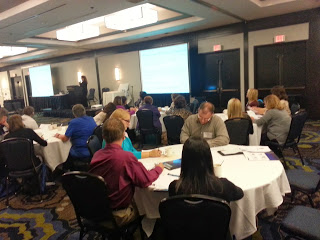Mindy is a University of Pittsburgh music student with an important audition the next day. By the time she walks into the emergency department of this make-believe hospital setting, she has a suspected mass on her trachea, her frantic mother arrives without gleaning much information from staff, and it all takes both way too long and too many twists.
Welcome to Dr. DiGioia’s neighborhood.
As part of his Patient and Family Centered Care (PFCC) program at UPMC, Anthony DiGioia, M.D., infuses conferences with a simulated exercise such as Mindy’s (not a real student). Mindy’s pretend adventures were all a part of the Shadowing workshop Friday at the Wyndham University Center, site of this two-day PFCC VisionQuest conference. Shadowing a patient and family ultimately engages patients as partners in the design of care delivery, which not only has been shown to improve outcomes and the experience but also saves resources and expenses.
“Ever since we started the PFCC Innovation Center in 2006, the program has grown to include more than 60 different care-experience working groups across the UPMC hospital system – and in other clinics and hospitals across the country,” said Dr. DiGioia, the force behind the Bone and Joint Center at Magee-Womens Hospital. “By using a live, stage production to simulate the clinical-care experience, it allows health-care professionals in the audience to shadow the patient and family, then provide feedback. It’s so important, we find, for us to view all care through the eyes of patients and their families – and, in the end, it enables us to improve our processes as well as the patients’ experience in order to provide better care and comfort to them.”
John Houde, M.D., an orthopaedic surgeon from central New Hampshire, attended the VisionQuest conference in Washington, D.C., last May. This week, he sent four of his practice’s key workers to Oakland for the next VisionQuest.
“He is very interested in the PFCC model,” said Becky Van Dolah, his physician assistant. They’ve already launched the Shadowing methodology, hoping to simplify a clinical calendar already crammed. “It can be difficult to get into our clinic quickly, so we are looking at that process, getting our patients in faster.
“It has been extremely helpful,” Van Dolah said of this conference. “I’ve been all through the website, reading everything I can. But to be here and go through it. . . my head is swimming with ideas right now. I can’t wait to get back and get started.”








